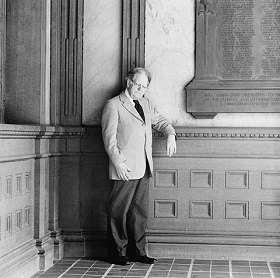Northrop Frye National Historic Person (1912-1991)

© Harry Palmer/Library and Archives Canada/PA-183431
Northrop Frye was designated a national historic person in 2018
Historical importance: Pre-eminent literary theorist, critic, and university educator.
Commemorative plaque: 73 Queen's Park Crescent East, Toronto, Ontario
Northrop Frye was an eminent literary theorist, critic, and teacher, based at Victoria College, University of Toronto, from 1939 to 1991. His systematic approach to literature examined the underlying myths and symbols that inform all of literature, challenged existing critical paradigms, and had a significant international influence, as did his work on the Bible as literature. As a critic, he influenced the work of a number of noted Canadian poets. Interviewed regularly on radio and television, his concept of the “garrison mentality” in the Canadian imagination had a profound impact on English-Canadian literature.
Northrop Frye
Based at Victoria College, University of Toronto, from 1939-1991, Northrop Frye was a pre-eminent literary theorist and critic. His classificatory and systematic approach to literature, which examined the underlying myths and symbols that inform all of literature, challenged existing critical paradigms and had a significant international influence on the field. Frye's critical work on English Canadian literature, especially poetry, had a profound impact on how Canadian literature was studied, written and perceived. He influenced the work of a number of noted poets and his idea of the “garrison mentality” as a defining myth in the Canadian imagination became a crucial way of interpreting Canadian literature. As a major intellectual in English-speaking Canada in the second half of the 20th century, Frye's ideas about education, literature, and Canadian culture were widely disseminated in the Canadian media and contributed to how Canadians saw themselves and their literature.
Born in 1912 in Sherbrooke, Quebec and raised largely in Moncton, New Brunswick, Frye began his studies at Victoria College, University of Toronto, in 1929. After receiving an MA at Oxford in 1938, he permanently joined the English department at Victoria College. He remained in that department for the rest of his career, becoming an assistant professor in 1942, an associate professor in 1946, chairman of the English department in 1952, principal of Victoria College (1959-67), and then chancellor of the college (1978-91). His many students include poets and authors Margaret Atwood, Dennis Lee, James Reaney, Eli Mandel, and Don Coles.
In 1957, Frye published his best known book, Anatomy of Criticism: Four Essays. This book had an enormous influence on modern critical theory, and Frye gained a considerable international reputation. Over the next decades, he was a visiting professor at a number of major universities, delivered public lectures around the world, and received 38 honorary doctorates from many of the major universities in the Western world. Despite this international acclaim, Frye felt closely connected to his Canadian roots. He was responsible for the University of Toronto Quarterly's annual review of Canadian poetry in English from 1950-60, and in 1962, delivered the Massey Lectures for CBC Radio (published as The Educated Imagination). He also served on the board of the newly-established Canadian Radio Television Commission (CRTC) from 1968-77. He was an early proponent of Canadian poetry and spoke widely on Canadian culture and identity.
Following Anatomy of Criticism, Frye published an additional 19 books, as well as some 300 essays and articles. These include The Bush Garden: Essays on the Canadian Imagination (1971), a collection of essays analysing Canadian poetry, literature, and painting, as well as two books on the connections that can be made between the Bible and English literature. In the 1970s and 1980s, new theoretical discourses such as post-structuralism became dominant and Frye's ideas lost their prominent place within the field. However, his influence continues to be felt. Frye died in Toronto on January 23, 1991.
The National Program of Historical Commemoration relies on the participation of Canadians in the identification of places, events and persons of national historic significance. Any member of the public can nominate a topic for consideration by the Historic Sites and Monuments Board of Canada.
- Date modified :